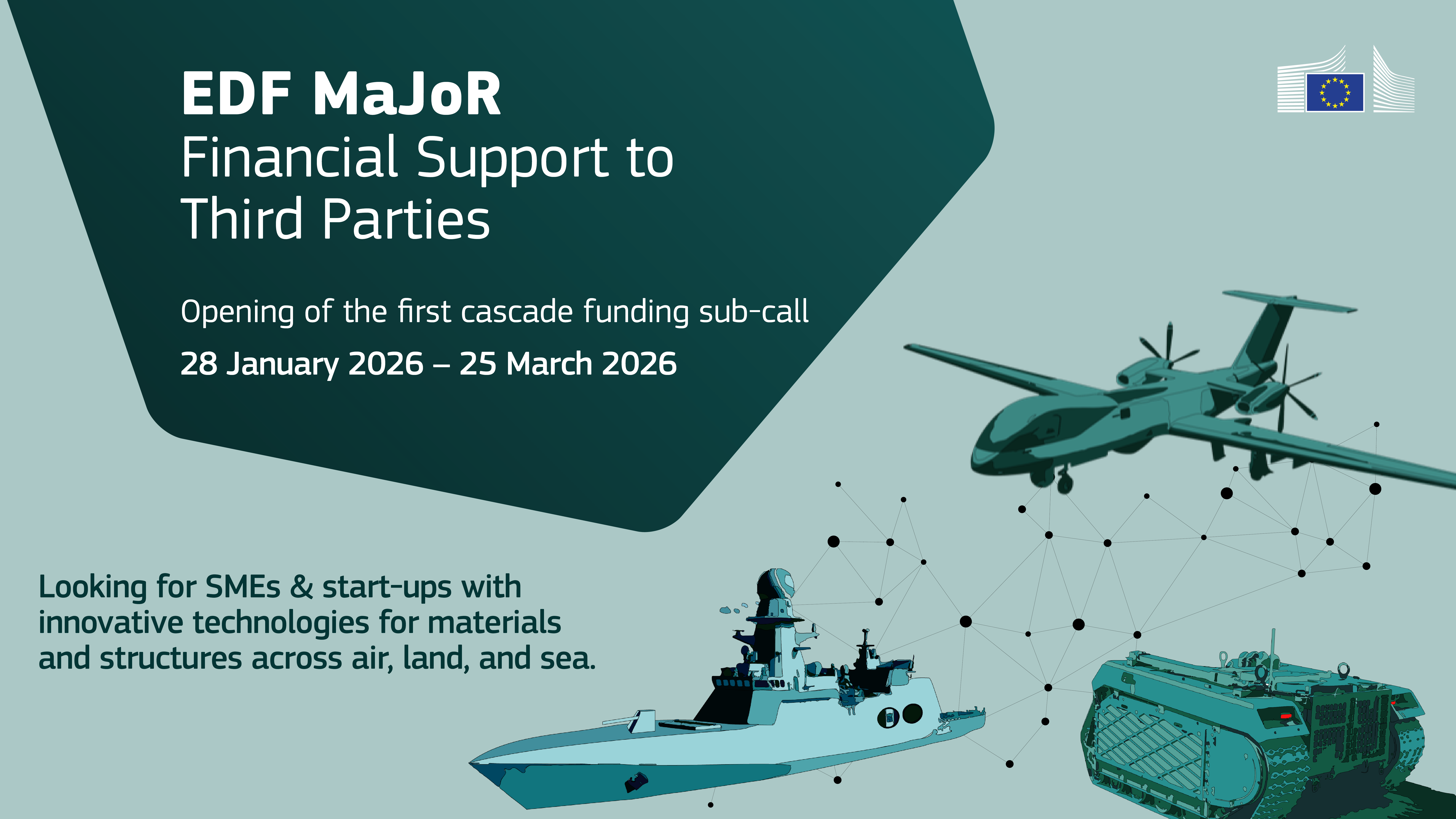
First sub-calls for the MaJoR project will be open from 28 January to 25 March 2026
EUDIS aims to enable the establishment of Innovation Test Hubs across the European Union by allowing consortia selected under the European Defence Fund (EDF) to finance innovative SMEs and start-ups without necessarily having previous experience operating in the defence sector.
The EDF grant beneficiaries are allowed to provide Financial Support to Third Parties (FSTP) in accordance with the conditions set out in the annual EDF Work Programme.
Rewards & Benefits
Easier access to EDF funding: Cascade funding simplifies and streamlines the funding application process for SMEs. It eases and improves access for smaller market players into the EDF.
Benefit from industry expertise: SMEs can connect with various industry stakeholders and benefit from activities that can solely be offered by consortia.
How does it work?
In line with Article 207 of the Financial Regulation, FSTP (or cascade funding) may be included as part of any grants upon request from beneficiaries.
The aim of such FSTP is to contribute to innovative technologies or specialised knowledge relevant to the topic in question and encourage the inclusion of various smaller players – including those not previously active in the defence sector – by allowing them to identify and increase potential business opportunities in this domain.
If the beneficiaries opt for FSTP, they must comply with the following conditions:
- The maximum amount to be granted to each third party is EUR 60 000.
- FSTP in the proposals must not exceed 5% of the requested EU contribution under the call topic concerned.
- Third parties must be established in the EU, in EDF associated countries or in Ukraine.
- Third parties must be subject to control by the EU, EDF associated countries or Ukraine, or by entities from the EU, EDF associated countries or Ukraine.
- FSTP must target as a priority SMEs, including start-ups. Applicants for FSTP must have self-assessed their SME status. The consortium should perform checks on the basis of random sampling in accordance with the criteria defined in Article 2 of the Annex to Commission Recommendation 2003/361/EC. The participation of entities other than SMEs can only be accepted where no SMEs are available to demonstrate the capacity or expertise needed for the project during its lifetime.
- A range of entities from different EU Member States, EDF associated countries or Ukraine as well as different industry sectors, including those not active in the defence sector, should be involved.
- The consortium is expected to issue FSTP dedicated sub-calls for proposals with a target of minimum 3 recipients of FSTP per sub-call, depending on the research and industrial landscape of the target domain, with a view to giving the third parties the opportunity to demonstrate their knowledge, technologies, capabilities and products/solutions within a maximum 6-month cooperation programme that encompasses the associated tasks.
- The recipients of FSTP may be involved in any type of eligible activity within the proposal. The following activities, but not limited to this list, may be considered for cascade funding:
- customised support by providing battlefield proven knowledge, technology-specific expertise or innovative tools;
- support the manufacturing of technology test samples or components necessary for assessment;
- proof of concept; technology modification or demonstration;
- analysis and measurement;
- participation in a hackathon or technological challenge;
- technology showcase.
Apply for 2026 Calls
EDF Work Programme 2026 introduces the possibility for all EDF projects to use the FSTP mechanism, further facilitating the participation of start-ups and SMEs through simplified access to funding and easier integration into collaborative projects.
If FSTP is envisaged, the proposals must describe the associated management and implementation tasks for this FSTP, including the following ones:
- Screening and identifying the landscape of suitable candidates from various sectors, including those that have not been active in the defence sector before, for the FSTP-related sub-calls organised by the consortium.
- Providing a clear methodology so that the FSTP’s contribution to the innovation performance of the supported SMEs in the short term can be measured, e.g. via indicators such as numbers of new or significantly improved products (goods and/or services), processes, new marketing methods or new organisational methods, together with its impact on resource efficiency and/or turnover.
- Preparing the call documentation to issue the sub-calls for FSTP.
- Organising up to two sub-calls for FSTP, including:
- the method for calculating the exact amount of financial support requested by the third parties;
- the payment arrangement options available to third parties;
- the possible types of activities for which a third party may receive financial support;
- the potential results to be obtained;
- the roles and responsibilities of the consortium with regard to FSTP management. - Selecting and awarding FSTP recipients.
- Describing how the support to FSTP recipients may contribute to any type of task within the proposal, while clearly delineating the expected contributions from the main beneficiaries as well as from the FSTP recipients to ensure their coherence and impact.
For more information, please consult the EDF Work Programme 2026 conditions.
Opening of the first cascade funding sub-call for the EDF MaJoR project

The first EDF MaJoR cascade funding is open from 28 January 2026 to 25 March 2026:
The MaJoR project focuses on modernising defence systems and improving the durability of future platforms through innovative technologies for maintenance, joining, and repair of multi-material structures across air, sea, and land domains.
This first FSTP sub-call is looking for up to 30 innovators to act as technological solution providers and address specific innovation challenges across the three domains.
Eligible participants including SMEs and start-ups established in EU Member States, Norway, or Ukraine. Ukrainian entities are particularly encouraged to apply.
The areas of interest for this sub-call include:
- Hybrid structures for defence platforms: multi-material design, joining and reversible interfaces
- Innovative joining technologies and processes for multi-material defence structures
- Structural health monitoring, health and usage monitoring systems and embedded sensor architectures for next-generation defence platform
- Non-destructive testing for bonded joints: maintenance, repair, bonding initial design and diagnostics for hybrid and composite structures
- Digitalisation, AI and decision support tools for structural assessment and defence maintenance
Successful applicants will receive up to €60,000 in funding and participate in a 6-month business development support programme.
When consortia will organize a cascade funding call for start-up companies?
Results of the 2023 Call:
The EDF 2023 round of calls for proposals included one category of Development Action in Materials & Components.
The winning consortium is MaJoR, which received funding of EUR 30,000,000 for the project, of which EUR 3,600,000 or 12% is allocated as FSTP.
The first EDF MaJoR cascade funding call will open on 28 January 2026 and will remain open until until 25 March 2026. In this initial round, the consortium will be looking for SMEs and start-ups that can provide technological solutions in 5 materials-related areas across the 3 domains in MaJoR (Air, Land, Sea).
Further details can be found in the dedicated section of the project website: MaJoR - Cascade funding
Results of the 2024 Call:
The EDF 2024 round of calls for proposals included one Research Action in the Simulation & Training category on the topic Methods for bridging reality gaps
The winning consortium is BATTLEVERSE, which received funding of EUR 15,000,000 for the project, of which EUR 2,400,000 or 16% is allocated as FSTP.
The consortium will organise cascade funding calls for SMEs and startups during the project implementation.
For example, if the project implementation will take place for 36 months, i.e., from 1 December 2025 – 30 November 2028, the consortium will organise one or two cascade funding calls for third parties, being SMEs and start-ups, during that time. It is up to the EDF consortium to decide on the precise timing. This call is carried out under the guidance of the European Commission.
The EDF consortium will advertise, select, award SMEs or start-ups and provide a set of support services.
Cascade funding, also known as financial support to third parties (abbreviated to FTSP), provides EU funding to beneficiaries. A consortium receives EU funding, following a regular competitive call procedure under the EDF programme, which is then provided to small players (such as SMEs) through a “call for third parties”. This call is organised by the consortium, not the Commission.
Cascade funding aims to foster cross border defence innovation networks in specific technology areas in Europe.
Specifically, beneficiaries of FSTP must receive financial support to prepare a sample of their technology, to attend and support the testing of their technological sample, and to technologically improve their solution. FSTP may also be provided to entities that contribute with analysis and measurement capacities, technology-specific expertise, innovative tools, or support the manufacturing of technology test samples or components necessary for testing. The proposals must include technical mentoring for the selected beneficiaries of the FSTP as well as the set-up of additional measures to support the beneficiaries business case.
It is expected that FSTP will improve innovative SMEs and small players’ access to the EDF. Through working with consortia, the application process for funding is simplified and access to funding is streamlined. It also allows for small players to connect with a variety of industry stakeholders and benefit from a broad range of activities than be offered by consortia, including hands-on guidance. We aim to improve of the business environment and collaboration opportunities for innovative start-ups and SMEs in the defence domain by supporting open innovation and involving innovative actors and customers from different sectors and countries.
The first cascade funding call will open on 28 January 2026 and will remain open until until 25 March 2026.
These calls with be organised by the MaJoR consortium, which received funding of EUR 30,000,000 for the project, of which EUR 3,600,000 or 12% is allocated to the FSTP portion.
In this initial round, the consortium will be looking for SMEs and start-ups that can provide technological solutions in 5 materials-related areas across the 3 domains in MaJoR (Air, Land, Sea).
Further details can be found in the dedicated section of the project website: Cascade funding - Major Project
The first cascade funding calls with be organised by the MaJoR consortium.
Further details can be found in the dedicated section of the project website: Cascade funding - Major Project
The ceiling for the financial support to third parties (including SMEs) is EUR 60 000 per third party.
The call will be organized by the EDF grant beneficiary - a consortium that will implement an EDF project with FSTP.
The first cascade funding calls will be organised under the EDF 2023 project MaJoR, which received funding of EUR 30,000,000 for the project, of which EUR 3,600,000 or 12% is allocated to the FSTP portion.
Further details can be found in the dedicated section of the project website: Cascade funding - Major Project




